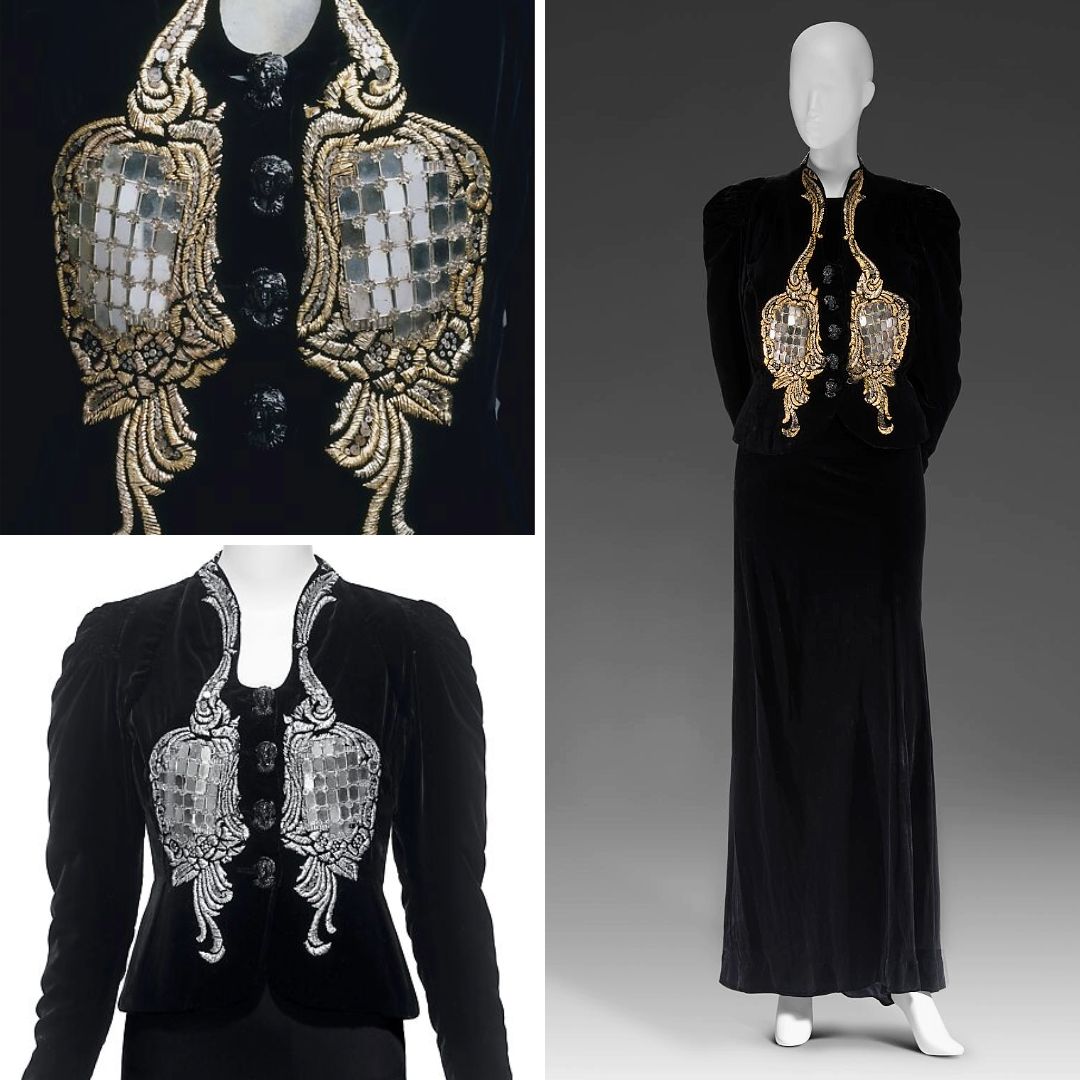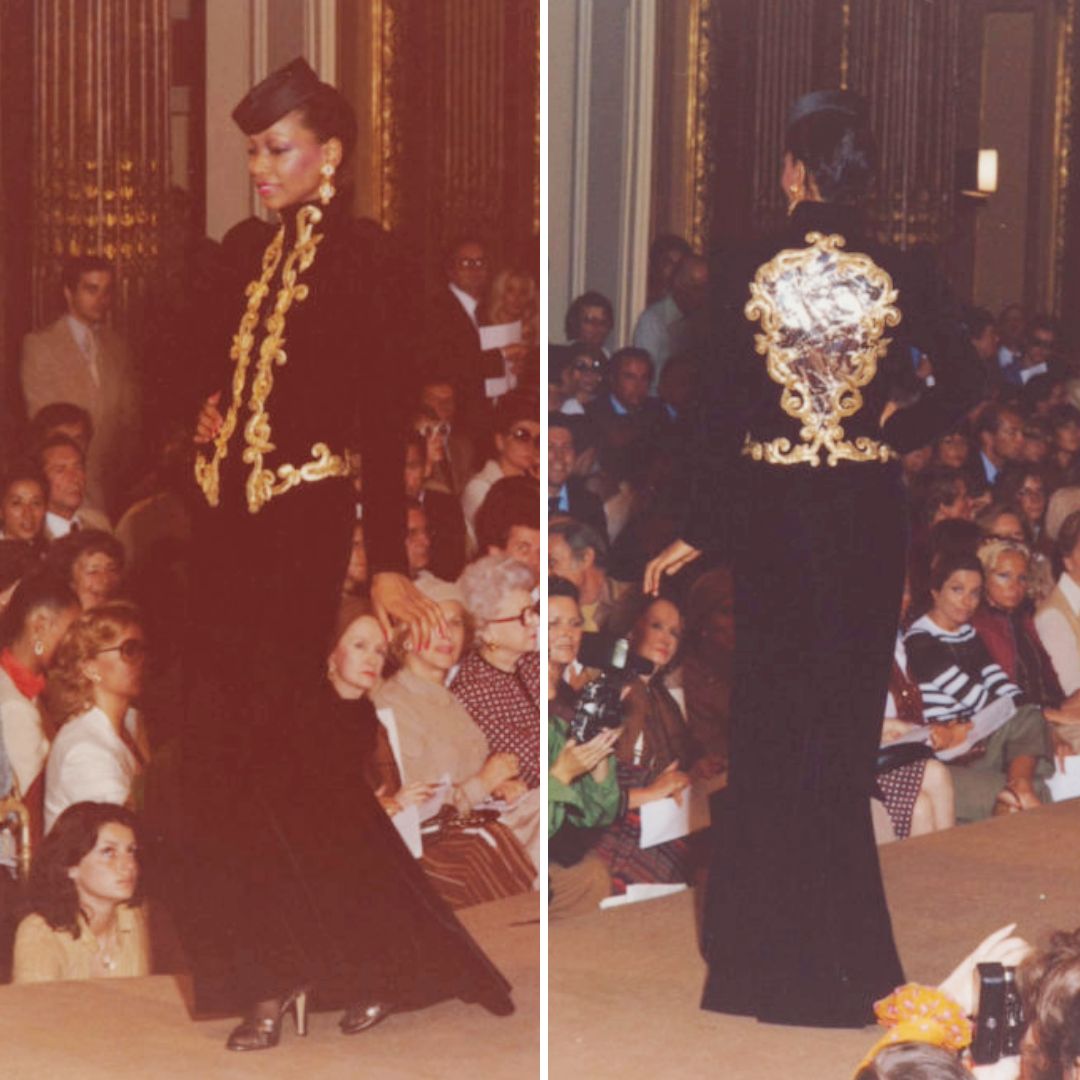Broken Mirror Jackets: Schiaparelli (1938–39) and YSL (1978)
New to Luneville embroidery?
Start with the chain stitch—my free visual guide shows you exactly how
Two couture jackets show how a strong idea moves across decades. In 1938–39, Elsa Schiaparelli stages mirror motifs inside baroque frames. In 1978, Yves Saint Laurent revisits the concept and puts the “break” on the back of a short velvet jacket. Same language, different placement and materials — and two very specific outcomes.
Schiaparelli, 1938–39: what’s on record
Museum entries from the late 1930s establish the vocabulary clearly. One evening jacket (winter 1938–39) in black velvet sets hand-mirror motifs inside scrolling frames; the “faces” of those mirrors are shown as fractured. Another ensemble from the Zodiac collection (autumn–winter 1938–39), often titled Hall of Mirrors, uses framed reflective panels on the front of a black silk velvet jacket, with glass beads, sequins and metallic threads controlling how the light sits on the body. The structure is jacket-first, ornament-second: shoulders are padded, closures are planned, and the reflective elements are contained by embroidery lines rather than scattered across the surface. The effect reads as designed light, not random sparkle.
Yves Saint Laurent, A/W 1978 haute couture: what changed
Four decades later, Saint Laurent returns to the mirror idea and redirects the impact. The house presents a short, six-panel black silk velvet jacket with a back panel that reads as a shattered baroque mirror in trompe-l’œil. Credits are explicit:
Creation: Yves Saint Laurent.
Execution: Atelier Felisa.
Embroidery: Maison Lesage.
The framing scrollwork extends over hem and shoulders; inside it, “shards” form a controlled burst. The front remains relatively clean. Contemporary descriptions note a modern material mix — silver plastic inserts and crystals — to achieve a crisp break without the mass of glass. The division of labour is visible in the result: a stable tailored body and an engineered surface that holds the illusion in place.
One comparison, and why it matters
Both jackets work to the same grammar — frame, reflective plane, controlled fracture — but deploy it differently. Schiaparelli stages the motif frontally, folding it into the fastening line and button rhythm; Saint Laurent moves the reveal to the back, which changes how the garment photographs and how the audience encounters it. Materials track their moment: late-1930s glass and early plastics versus 1978’s lighter synthetics and crystal. The explicit credits in 1978 underline couture practice: a tailoring atelier builds the base; a specialist embroidery house engineers the surface. For anyone who works with embellishment, this is the real point: placement and structure lead, materials support, and authorship is shared and named.
Being inspired by a house is not the problem. Doing it without thought is. Saint Laurent didn’t copy Schiaparelli; he adjusted site, material and emphasis, and credited the work. That’s the standard I respect: refer, transform, and name your partners.
Written By
Ksenia Semirova
MA Textiles
An experienced hand embroidery and textile artist based in Hove, UK. Professionally practicing since 2021, mastering various techniques.
Also a fine artist and visual researcher, exhibiting her works across the UK and internationally.
Join my mailing list
Get the latest and greatest updates to your inbox!

